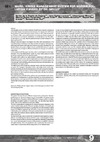Identificador persistente para citar o vincular este elemento:
https://accedacris.ulpgc.es/jspui/handle/10553/74078
| Título: | Crisis management system for marine pollution | Autores/as: | Cuesta de Bedoya, Carlos de la Carlos Lorenzo, Irene López Marco, Jaime Espino, Manuel Cobo, David Galván González, Blas J. Díez Arenas, Raquel Otero Paz, Samuel |
Clasificación UNESCO: | 3308 Ingeniería y tecnología del medio ambiente | Palabras clave: | Oil Spill Decision Support System Crisis Management Marine Pollution Contingency Plan |
Fecha de publicación: | 2013 | Proyectos: | Mar y Ambiente Marino(Mar2) | Publicación seriada: | Instrumentation viewpoint | Resumen: | Unfortunately, several accidents related to oil spills have produced catastrophes with a high impact in the marine environment as, for instance, the well-known Prestige vessel accident in the west northern of Spain in 2001, Erika vessel southern of Wales in 1996… but not all these kind of incidents are related to vessels, the most recent ones are linked to oil platforms as the PetroBras in Sao Paulo (Brasil) last April 2013, or Deep Water oil platform rented to British Petroleum in the Mexico gulf last 2012. Although these accidents do not happen very often, their consequences in the ecosystems (fauna and flora), in the deep-sea floor, atmosphere and water pollution and their impact in the regional economies are quite important that, the Spanish Government, aware of Spain has almost 8.000 kilometres of coast, decided to promote and support different mechanisms to manage and control this kind of crisis. In this context the MAR2 project was born, which overall objective is the implementation of a Crisis Management System for those marine pollution events caused by accidental and non-accidental oil spills. The system will be able to run high resolution simulations of spills through the acquisition of real-time ocean-meteorological data, centralize and store all crisisrelated information, manage the operational response and provide support the Crisis Manager Team facilitating the access and interaction with the relevant Marine Pollution Contingency Plans. The MAR2 system will include both, a desktop version with full functionalities to be used in the Emergency Operations Centre, and mobile-device version optimized for facilitating the work of field operators in the spill. During the project lifecycle will be executed two trials: in the Port of Vigo and in the Port of Las Palmas (both in Spain) in order to perform training exercises that will allow the validation and calibration of MAR2. The implementation of MAR2 will be useful for end users related to Public Administrations with responsibilities on the first responders on marine pollution accidents, industries, and in general all those entities which handle hydrocarbons in their facilities during their business activity within the maritime and port environment. | URI: | https://accedacris.ulpgc.es/handle/10553/74078 | ISSN: | 1886-4864 | Fuente: | Instrumentation ViewPoint [ISSN 1886-4864], n. 15, p. 1-0 | URL: | http://dialnet.unirioja.es/servlet/articulo?codigo=7517999 |
| Colección: | Artículos |
Visitas
31
actualizado el 11-ene-2026
Descargas
10
actualizado el 11-ene-2026
Google ScholarTM
Verifica
Comparte
Exporta metadatos
Los elementos en ULPGC accedaCRIS están protegidos por derechos de autor con todos los derechos reservados, a menos que se indique lo contrario.
